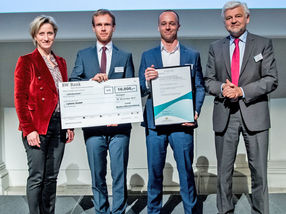European Medicines Agency recommends approval of sofosbuvir
First-in-class medicine provides the first interferon-free treatment option
The European Medicines Agency's Committee for Medicinal Products for Human use (CHMP) has recommended granting a marketing authorisation for Sovaldi (sofosbuvir), for use 'in combination with other medicinal products for the treatment of chronic (long-term) hepatitis C in adults'.
Hepatitis C virus (HCV) infection is a major European public-health challenge. It occurs in between 0.4% and 3.5% of the population in different European Union (EU) Member States.
The current standard of care includes a combination of the medicines pegylated interferon and ribavirin, with or without an inhibitor of the viral NS3/4A protease enzyme. However, interferon-based therapies are associated with potentially serious side effects, which are sometimes difficult to manage and also make a considerable proportion of HCV patients ineligible for therapy. This includes patients with very advanced liver disease, as well as patients with psychiatric diseases, autoimmune disorders, etc. For these patients, there is a very clear unmet medical need for new HCV treatment regimens.
The treatment of hepatitis C is a rapidly moving therapeutic area, with several new classes of direct-acting antivirals now in advanced stages of development. The European Medicines Agency is actively supporting the development of these new treatment options for patients through provision of scientific advice and drafting of guidance to developers of these medicines.
Sovaldi is the first representative of a new class of antivirals that act as inhibitors of an essential enzyme of HCV, the NS5B ribonucleic acid polymerase. This medicine provides the first interferon-free treatment option for chronic hepatitis C.
In clinical trials where sofosbuvir was used in combination with ribavirin alone, it has convincingly shown efficacy with a good safety profile. A high proportion of patients had no detectable virus in their blood 12 to 24 weeks after the end of the treatment and could therefore be considered to be cured of their hepatitis C virus infection.
Furthermore, when Sovaldi is used in combination with pegylated interferon as well as ribavirin, shortened treatment duration down to 12 weeks (compared to 24-48 weeks with the current standard of care) is possible and provides high efficacy. This is of value considering the side-effect profile of interferon.
New treatment option for HCV patients undergoing liver transplantation
HCV infection is the most common single cause of liver transplantation in the EU. However, patients who do undergo liver transplantation due to hepatitis C have a worse prognosis than patients who do so for other reasons, because recurrence of the virus in the graft is near-universal and often aggressive. For many of these patients, there are currently no approved treatment options that are likely to be effective.
In clinical trials, Sovaldi in combination with ribavirin has shown its capacity to prevent reinfection of the graft, and thus provides a treatment option for patients with HCV infection who are on the waiting list for liver transplantation.
Most read news
Topics
Organizations
Other news from the department politics & laws

Get the life science industry in your inbox
From now on, don't miss a thing: Our newsletter for biotechnology, pharma and life sciences brings you up to date every Tuesday and Thursday. The latest industry news, product highlights and innovations - compact and easy to understand in your inbox. Researched by us so you don't have to.

















































